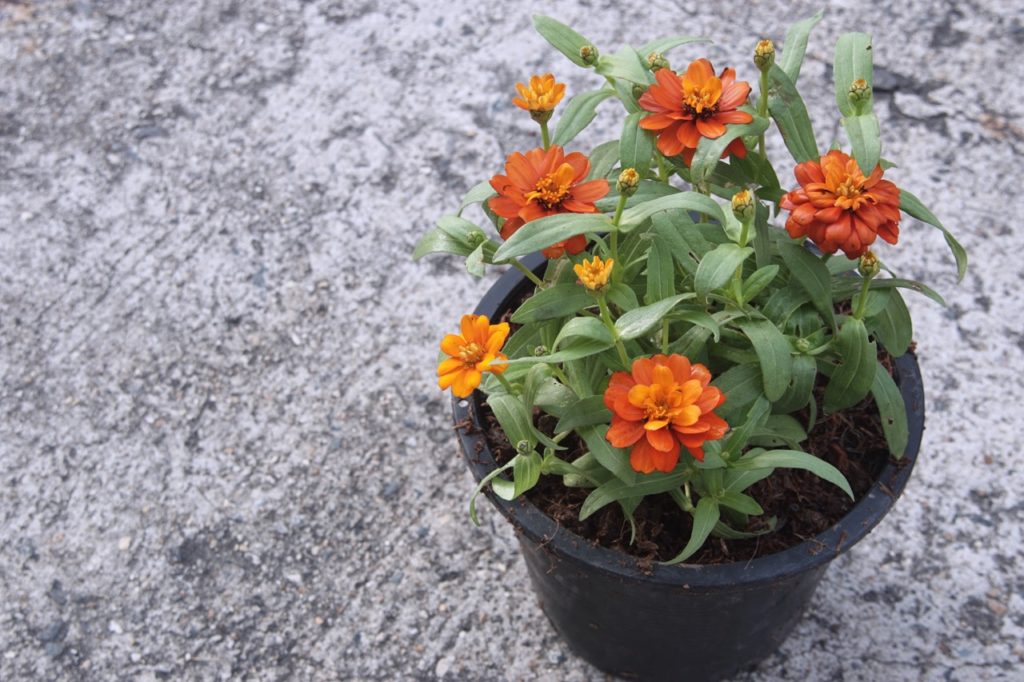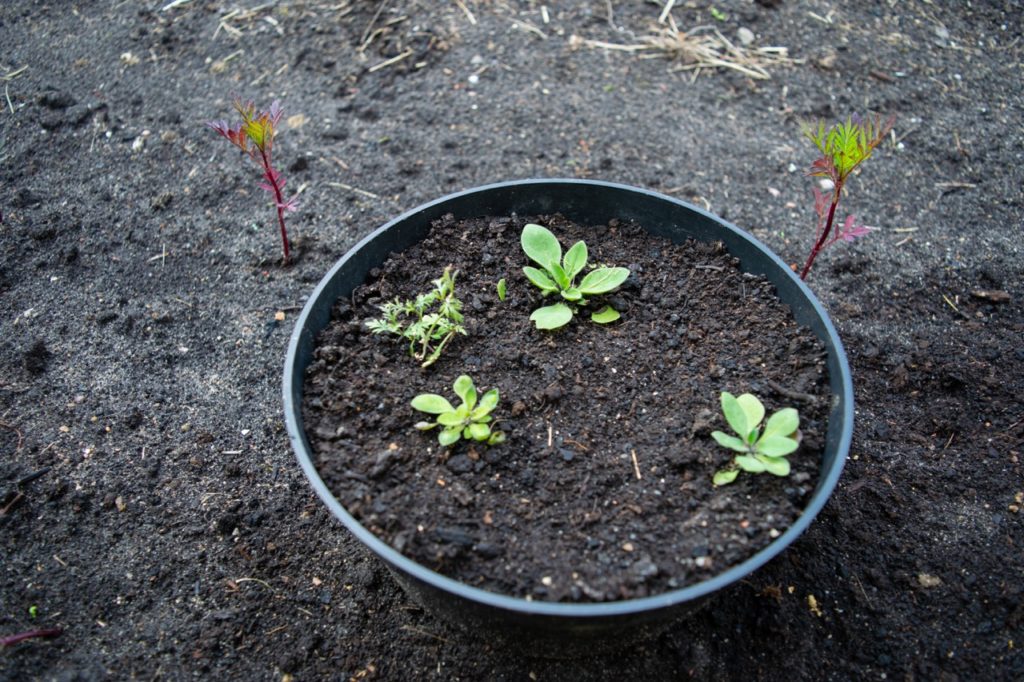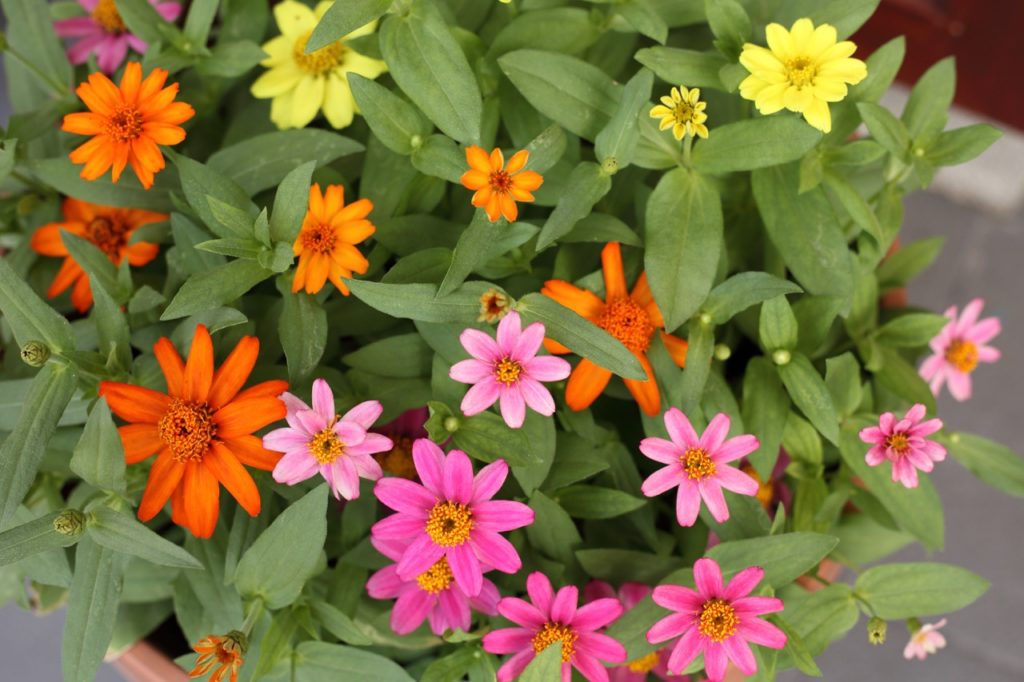ANNUALS > old maid > CONTAINERS
IN THIS GUIDE
old maid GUIDES

Container GrowingCut Flower TypesSowing
With their bright colouration , beautiful blossoms and popularity amongst bees , butterfly and hummingbird , old maid are exceedingly attractive flowers that can lighten up any outside perimeter or bed .
What ’s more , they ’re one of the easy yearly to coax into impressive blooms and that ’s just as true when planting in container as it is in the earth .

So , if space is at a premium in your garden , potted zinnias might be the answer .
While experient gardeners should face no problems whatsoever in naturalise zinnias in containers , amateur might still have a few dubiousness about the physical process .
Here are eight of my top peak when develop zinnias in good deal :

1) Choose Low-Growing Varieties
So can zinnia be grown in jackpot ? The answer is a resounding yes !
All type of zinnia lend themselves to container development , though you might recover that taller variety can become top - heavy and require staking – or that their tooth root systems can become overcrowded .
To invalidate complications , I ’d rede seeking out smaller , low - growing varieties of zinnia .

Some good options includeSanvitalia procumbens(Creeping Zinnia),Zinnia elegans , Zinnia marylandica – while the Profusion and Dreamland Series are also salutary choices .
2) Leave Room For Their Roots!
It ’s important to note that zinnias can react negatively to transplantation , so the good course of study of action would be to establish them directly in the pot you mean to maturate for the long terminal figure .
They ’re not bad-tempered in terms of textile – charge card , terracotta , concrete or indeed any other substance will work well as long as it has tolerable drain kettle of fish .
However , size of it is an crucial condition .

Zinnias require room for their roots to develop , so always choose a jackpot with a minimum depth of 15 - 20 cm .
The width of the pot should be the same for item-by-item plant and adult for multiple groupings .
Elongated grass are a great choice for meld dissimilar colours and varieties , but just be sure to pass on a 10 atomic number 96 minimum spatial arrangement on either side of your seedlings .

3) Use Well-Draining, Slightly Acidic Soil
Zinnias are quite resilient and will cope tolerably well in almost any type of grease , as long as it drains sufficiently .
Having say that , they will do well when the produce sensitive has productive constitutional content and is slightly on the acid side , with a pH level of between 5.5 - 7.5 .
If you ’re using stain you ’ve taken from the garden , you may boost its drain properties by adding perlite premix .

you may also enrich it with aged compost , which will infuse the pot with the nutrients that the flora need to really thrive .
4) Grow From Seed To Avoid Transplantation
Zinnias are mostly maturate from seeds , which are thankfully quite large and easy to handle .
If you ’re project to position your potted old maid flower outdoors , get the sowing unconscious process ( indoors ) around 6 week before the last icing .
This will give them enough metre to establish themselves indoors .

If they ’re going to stay inside indefinitely , you’re able to start them at any time .
make full your container with the filth mix observe above , provide a few centimetres barren at the top .
Sprinkle a fistful of seed onto the soil and cover up them with a little more ground .

Water the top of the soil lightly so that it ’s moist but not saturated .
Bear in mind that pot zinnias begin indoors will shoot far more speedily than those planted outside in the ground .
Even just a few daytime after sowing you might begin to see sprouts emerge .
As soon as this happens , remove the plastic plastic film and move the pot to a location where it will receive sizeable sunlight ( at least 6 hour per day ) .
This could be a gay windowsill , balcony or indoor garden .
Once the seedlings have 2 genuine leaves apiece , thin out them out and keep only the healthiest - looking plants .
If moving outside , it ’s a good thought to do so in stage so that the sudden change in temperature and clime does n’t scandalize your young plants to dying .
For example , you could move it to a shadier spot indoors first to acclimate it to lower temperatures .
5) Leave A Gap Between Plants
As cite above , a good rule of thumb is to give up 10 centimetre on either side of your seedling so that the roots of the industrial plant have enough space to recrudesce .
As a result , the number of zinnias you’re able to institute per pot will depend entirely on the property of your container .
Many people only stand by to one per flock and achieve fantastic results that way of life .
6) Keep Well-Watered
It ’s important to assure that the soil service your potted zinnia never to the full dries out , but is never waterlogged either .
or else , calculate to preserve moisture levels at all times .
you could check off whether it take a potable by sticking a finger into the soil and if the top 2 - 3 cm feel wry , it ’s definitely thirsty .
Water the soil directly and avoid getting the farewell wet , as this can make fungous disease .
7) Add Fertiliser To Pots
For the best resolution , you’re able to fertilise your old maid plants with a well - balanced household plant plant food , cut to half its strength .
product with high-pitched phosphoric stratum help the plant life to process nutrient .
Fertilise 1 - 2 sentence a calendar month the right way through the growing time of year , but stop altogether as soon as autumn hits .
8) Deadhead To Prolong Flowering
Deadheading is strongly encouraged for zinnias , as this will airt Department of Energy away from the seed fuel pod of the spent blooms and prompt it to get more flowers .
“ Zinnias are one of the few plants that I would deadhead , both because the pass blooms detract from the overall appearance and because flowering will be sustained over a longer stop with regular deadheading , ” partake in Horticultural Consultant Colin Skelly .
When wangle appropriately , deadheading can prolong and intensify the blooming season .
It ’s also a upright mind to rationalise your zinnia works if it looks like it ’s becoming bushy or overcrowded .
If there ’s not enough air circulation between the foliation and the bow , you could launch the risk of blight .
As zinnias are annual , there ’s no need to weigh overwintering .
You should , however , keep your seeds ready to hand , since you ’ll need them to gain a fresh wad of beautiful efflorescence plants the undermentioned spring .